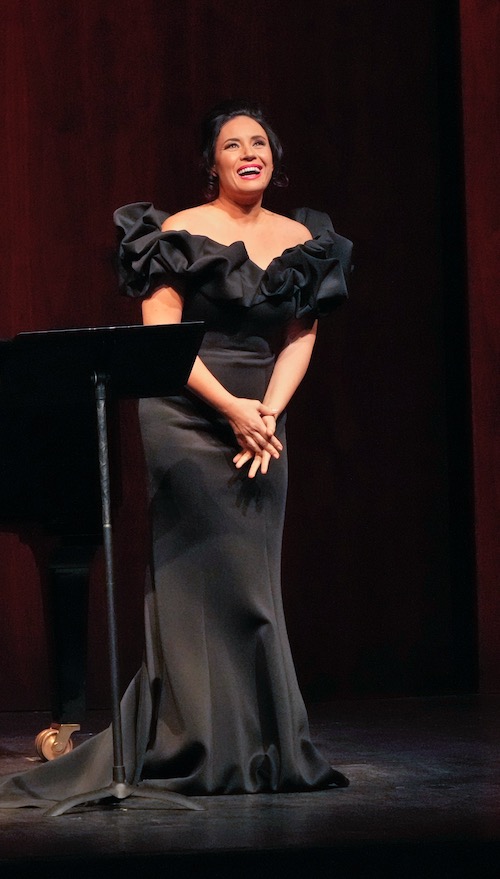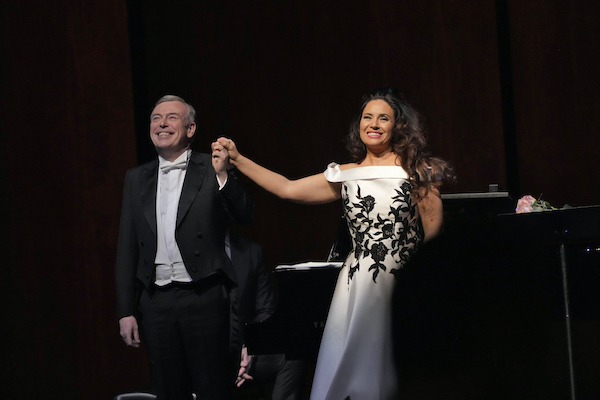Yoncheva’s encores bring belated passion to Met recital

Sonya Yoncheva has joined a relatively select number of singers who have graced the stage of the Metropolitan Opera in a solo recital. Since making her Met debut as Gilda in Rigoletto in 2013, Yoncheva has gone on to sing Violetta in La Traviata, Desdemona in Otello, and the title characters of Tosca, Luisa Miller, and Iolanta. In February, she will sing Elisabeth de Valois in a new production of Don Carlos in by David McVicar of the original five-act French version of the opera with Yannick Nézet-Séguin conducting.
Already in New York for rehearsals, a solo recital by one of opera’s hottest stars seemed just the ticket to bring opera lovers flocking to the Met. It was worth a shot and the Bulgarian soprano’s fans turned out in force. Her recital of French and Italian songs, however, only took flight after the final song on the program.
The three encores — “Donde lieta uscì” from La bohème, the Habanera from Carmen and “Adieu notre petite table” from Manon — brought the audience to its feet. At last there was full-voiced singing, passion and spontaneity, which had been strangely lacking for much of the evening.
There might have been more if Yoncheva hadn’t been so focused on the music stand in front of her. The tone of the recital was set with the first song, Henri Duparc’s “L’invitation au voyage,” in which Yoncheva beckoned the audience into a world where all is beauty, luxury, calm, and delight. Perhaps the atmosphere was a bit too placid, but she ticked the beauty and luxury boxes.
From the outset, it seemed as if she and the superb pianist Malcolm Martineau were competing to see who could make the softest sound that would carry into the house. Martineau won hands down with the final notes of “L’invitation au voyage”. It’s hard to imagine any sounds so delicate and sparkling ever before having been heard at the Met.
Most songs on the program dealt with love either unrequited, doomed or lost. An outburst of passion, such as in Duparc’s “La vie antérieure” with its images of living in splendor attended by bare-bodied sweet-scented slaves, was rare. The refrain in Pauline Viardot’s “Haï luli!”—little more than nonsense syllables—was lovely. There was drama in Donizetti’s “Depuis qu’une autre a su te plaire’ also, as well as trills and flare in Delibes’s “Les filles de Cadix,” but such moments were rare.

Yoncheva had made a grand entrance at the start in an elegant black dress with a long train and returned after intermission in a voluminous white gown with sparkling black floral appliqués on its bodice. At the first sight of her returning to the stage, the audience broke into applause. The diva’s visual allure at least made consistent impact.
Four songs by Puccini opened the second half of the recital and brought greater excitement, mainly due to the bits of verismo flash in them. Melodies from the first one, “Sole e amore” would later be incorporated into Act III of La bohème. There were beautifully spun phrases and drama in “Mentia l’avviso” which followed, and a thrilling high note in ‘Canto d’anime’.
Giuseppe Martucci was the rare Italian composer who not only wrote no operas, but was a Germanophile. He was also a pianist of international fame, admired by Liszt and Rubinstein. Martineau gave a splendid account of the dramatic postlude that ends “Al folto bosco, placida ombria,” a long saga of the first awakening of passion that ends with tears, as did the final song, Verdi’s “L’esule”.
In between, were two songs by Tosti, “L’ultimo bacio” and “Ideale”. The latter performed so softly that it was robbed of all vitality, if not its beauty. The Verdi concluded the recital, with the first one of the set, “In solitaria stanza”, containing a soaring line that would many years later the composer would use in Leonora’s aria, “Tacea la notte placida,” in Il trovatore.
After the first encore, as if on cue, a fan handed Yoncheva a bouquet of pink roses. She cradled them during the Habanera and flirted with Martineau as she sang. After singing the final adieu in Manon’s aria, Yoncheva waved goodbye and that was it.


